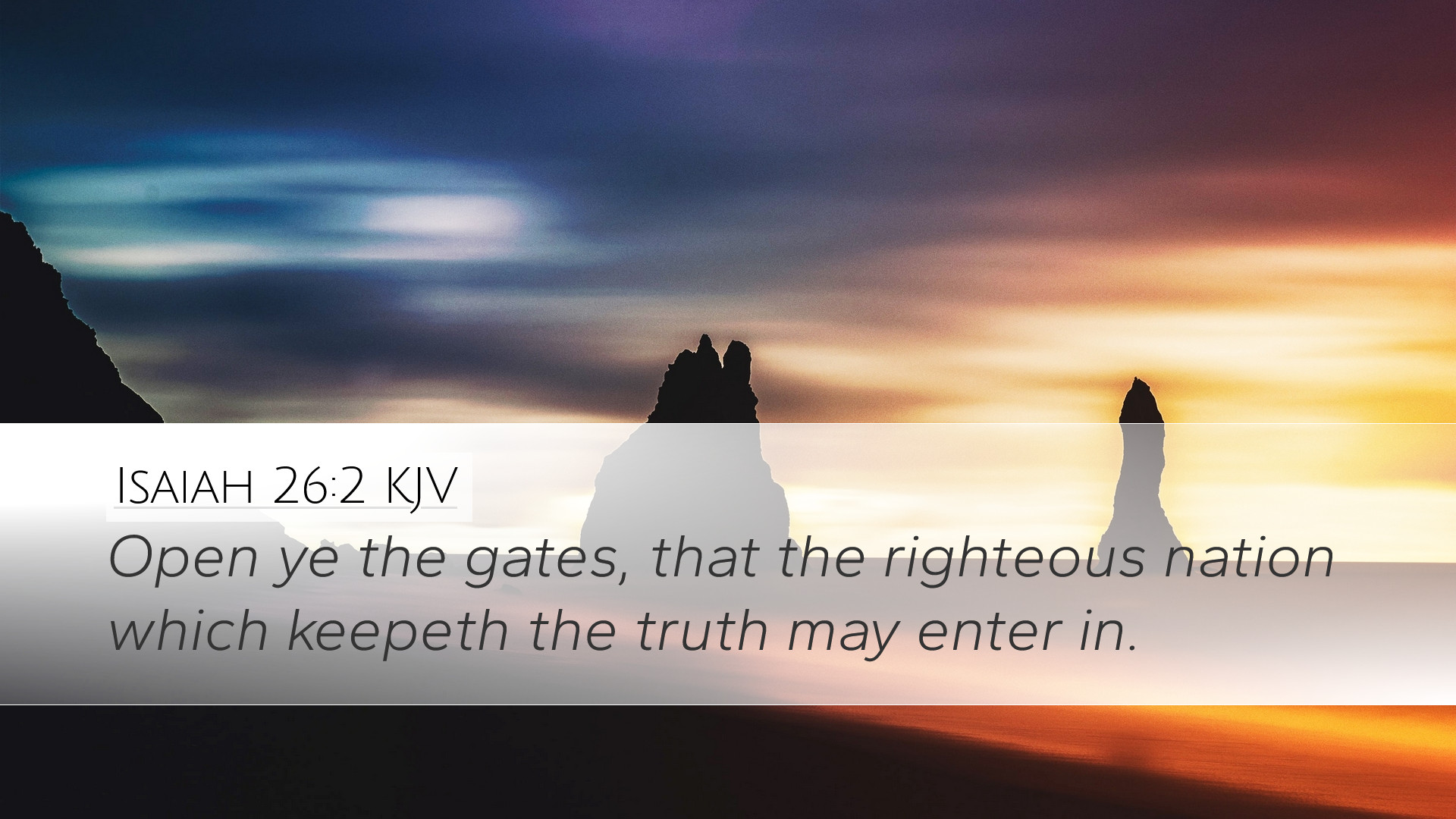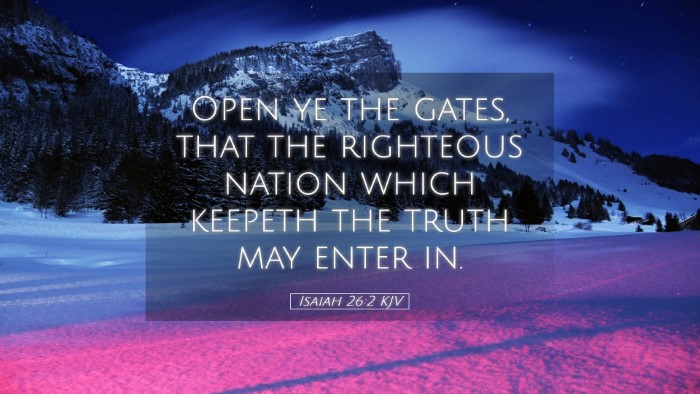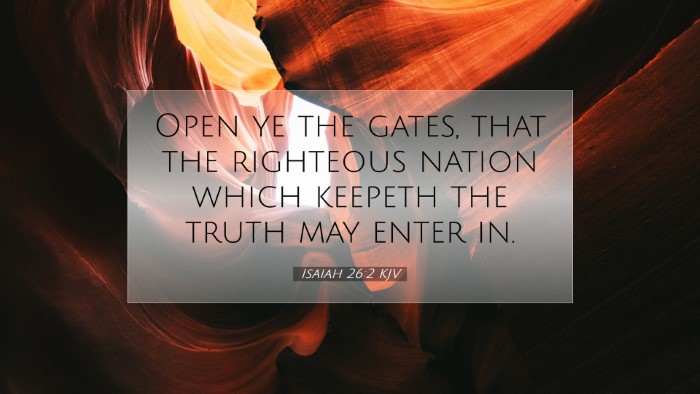Commentary on Isaiah 26:2
Verse: Isaiah 26:2
"Open ye the gates, that the righteous nation which keepeth the truth may enter in."
Overview
Isaiah 26:2 is a powerful verse that encapsulates themes of righteousness, truth, and divine protection. It serves as a beacon of hope for the faithful, emphasizing the invitation to enter into a place of safety and communion with God. Various commentaries reveal a richness of interpretation regarding its implications for both the immediate audience and contemporary readers.
Historical Context
The Book of Isaiah is situated during a tumultuous period in Israel's history, characterized by political instability and impending judgment. Isaiah proclaims hope amidst despair, offering promises of restoration and unity for those who hold fast to their faith in God. This passage speaks directly to the promise of protection and acceptance for those who are righteous.
Commentary Insights
Matthew Henry's Commentary
Matthew Henry emphasizes the significance of the ‘gates’ mentioned in this verse. He sees these gates not only as physical barriers but as symbolic thresholds indicating the entry into communion with God. According to Henry, this verse serves as a call for the righteous nation—those who uphold the truth—to step forward and claim their place within the divine shelter that God provides.
Key Points from Henry:
- Righteousness and Truth: The righteous nation is characterized by its adherence to truth, essential for fellowship with God.
- Divine Invitation: The call to open the gates reflects God's willingness to embrace those who seek Him earnestly.
- Security in God: This passage assures believers that their commitment to God will be rewarded with safety and acceptance.
Albert Barnes' Commentary
Albert Barnes highlights the eschatological implications of this verse. He views the ‘righteous nation’ as a metaphor for the faithful remnant of Israel and extends this concept to encompass all believers in Christ. Barnes argues that the gates symbolize access to God’s kingdom, emphasizing the conditions of holiness and truth required for entry.
Key Points from Barnes:
- Inclusivity of God’s Kingdom: Barnes suggests that this invitation extends beyond Israel, pointing towards a future where all faithful believers can enter God's presence.
- Significance of Righteousness: He emphasizes that maintaining truth is integral to enjoying God’s blessings and protection.
- Spiritual Gates: The gates represent not only physical entrances but also spiritual openness to God's transformative grace.
Adam Clarke's Commentary
Adam Clarke provides a detailed analysis of the text, drawing on Hebrew linguistic features to examine its depth. He emphasizes the term ‘righteous nation’ and interprets it as reflecting God’s covenant people who remain steadfast in their commitment to God’s law. Clarke’s interpretation underscores the importance of faithfulness and the assurance of God’s presence during trials.
Key Points from Clarke:
- Covenantal Context: The righteous nation is seen as those who have maintained their covenant relationship with God.
- Faithfulness Under Difficulty: Clarke points out that this promise of entering through the gates is particularly relevant in times of tribulation.
- Transformation through Truth: The act of keeping the truth leads to spiritual transformation and acceptance in God’s sight.
Theological Implications
The theological implications of Isaiah 26:2 ripple throughout both the Old and New Testaments. The concept of righteousness and truth as criteria for entry into God’s presence foreshadows the New Testament teachings concerning faith in Christ as the way to salvation.
This verse challenges pastors and theologians to consider the nature of righteousness and the call to truth in their ministries. It reminds us of the importance of living out our faith as a testament to God's faithfulness.
Practical Applications
For pastors and teachers, Isaiah 26:2 serves as a model for encouraging congregations to seek righteousness and truth. It presents opportunities for preaching on the themes of hope, redemption, and the inclusive nature of God's Kingdom. Below are practical applications:
- Encouragement in Trials: Remind believers that they are invited into a secure relationship with God, especially during hardships.
- Discipleship Focused on Truth: Foster a deep commitment to teaching and living by biblical truth as a pathway to righteousness.
- Invitation to the Unsaved: Use this passage to underscore the inclusive call of the Gospel to all who seek God authentically.
Conclusion
Isaiah 26:2 is not merely an invitation; it is a profound piece of prophetic literature that bridges the ancient context with modern faith applications. By reflecting on the insights from Matthew Henry, Albert Barnes, and Adam Clarke, we gain a comprehensive understanding of its significance. This verse calls the faithful to embrace their identity as bearers of truth and righteousness, assuring them of God's favor as they enter into His presence.


